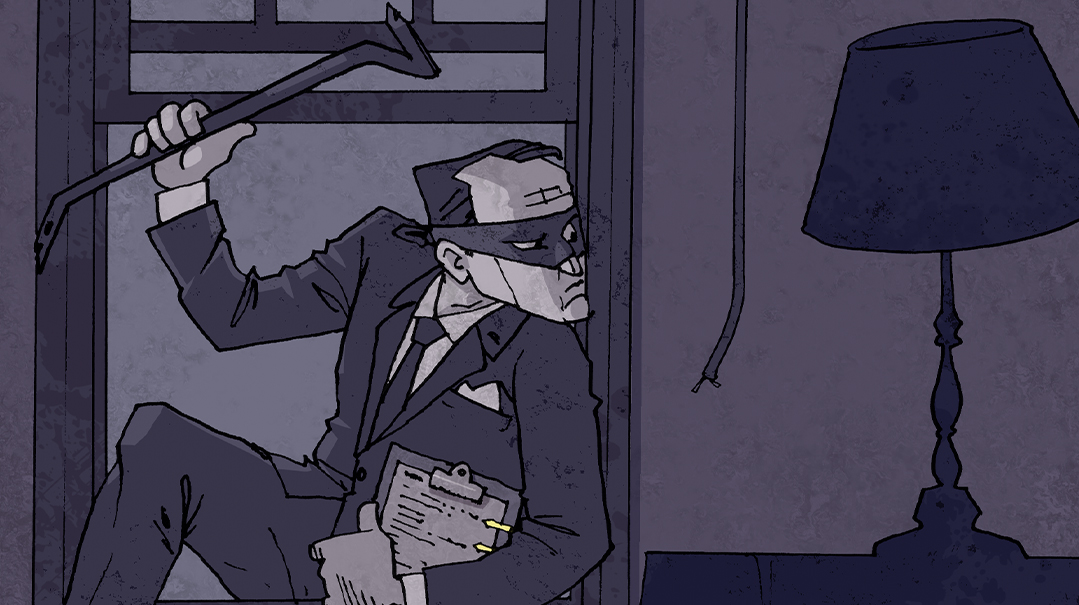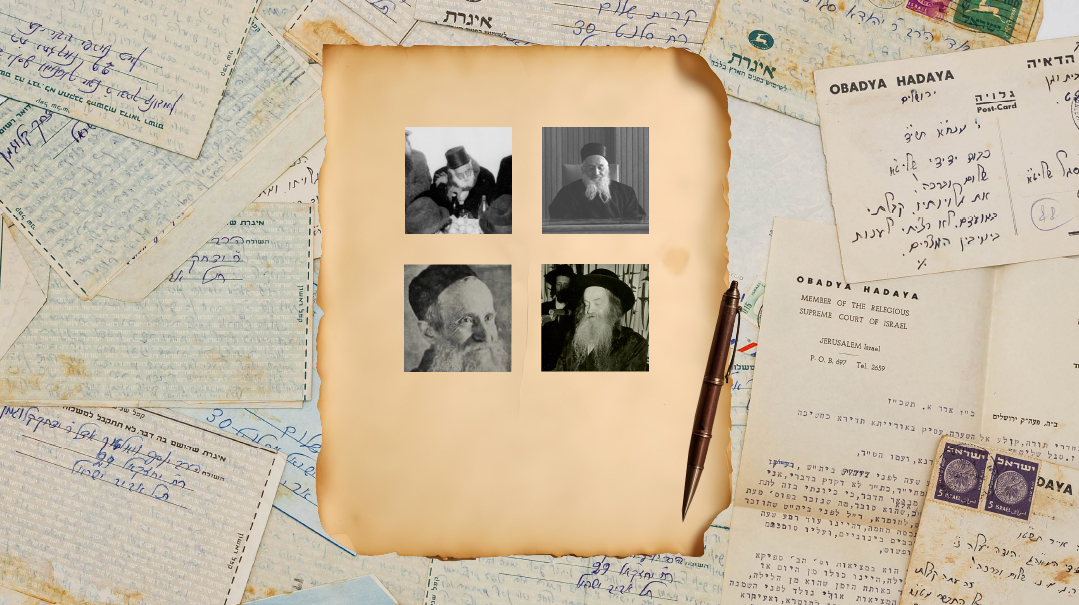Luck of the Draw

At three auctions we visited, the products might be different, yet the fever’s all the same

Illustrations: Dov Ber Cohen
Episode #1: House Hunters
The place: Hamilton County Court of Common Pleas, Downtown Cincinnati
The item: a three-bedroom, two-floor house
The stakes: an affordable starter house for a family of four
The metal detector buzzes loudly as we stand in line with dozens of others to enter the courthouse in downtown Cincinnati. This tall stately building is seeing a lot of action today. Some of those in line are there to support relatives facing trial, others are there to fulfill their civic obligation of jury duty, while Moshe and I are here for the weekly property foreclosure auction: We’re ready to roll the dice and see if Moshe can buy his first home at a steep discount.
This is actually more exciting than most sheriff auctions I’ve attended periodically over the years, mainly as an attorney on behalf of foreclosing banks. Although foreclosures are not my specialty, out-of-town foreclosure law firms often hire a local counsel to show up and bid on their behalf. It’s more than a little unpleasant if the family being foreclosed upon shows up and you’re the winning bid on behalf of the bank. In such situations, I’ve tried hiding, pretending to be late and needing to rush out, or sticking around for the rest of the auctions just to avoid getting cornered. As much as I explain that I’m just representing the out-of-town firm and know little about the case, I become the enemy that day, the one who’s taking their house away, helping the bank that will soon evict them and sell their home to a stranger.
But if Moshe can have a chance at a house today, I’m happy to help.
Foreclosed houses wind up at sheriff auctions after a lengthy process, starting when the homeowner stops paying the mortgage. Once the bank files the foreclosure lawsuit, the homeowner can still defend himself by poking holes in the bank’s mortgage or pleadings, showing the judge extenuating circumstances, or working out a loan modification for new payment terms. If that doesn’t work, the property is typically set for a sheriff sale.
o set the opening price, the sheriff’s department does a drive-by appraisal on the home, which typically appraises much lower than market value. The starting bid is set at two thirds of that price. While the prospective bidder cannot legally enter the property (which is still owned by the defaulting borrower), he can talk to neighbors and sniff around to get a sense of the house and the neighborhood before bidding. If the house is vacant, prospective bidders sometimes break in to take a quick look. As the property may have major damage, it’s mostly an investor crowd at these auctions looking for houses they can fix and flip.
While buyers can sometimes get a great deal, usually the lending bank has the winning bid. Banks may bid up to the amount they are owed without having to pay anything out of pocket: If the property was appraised at $300,000 and bidding starts at $200,000 while the bank is owed $275,000 including unpaid mortgage and interest, the bank can bid up to $275,000 without paying out of pocket. If the bank wins, they usually put the property on the market or package it with other properties to sell to investors.
When a property goes up for sale in the frum area, there’s the excitement of getting a home at a steep discount, which is why we’re here today. Moshe, who recently moved to Cincinnati, is renting a small apartment and looking for a house, but he is on a tight budget. While houses he’s looking at are generally in the $250,000 range, the house we’re here for today has an opening bid of under $100,000. Although it’s smaller and likely more outdated, the low price means he’ll be able to put in the work it needs. I’ve prepped Moshe and he has the $5,000 certified check he’ll need if he wins, with the rest to be paid within 30 days to the sheriff.
A few years ago, there was a great house near shul that had been abandoned a year prior. Four frum families were interested, but they didn’t want to bid against each other — the winning family would likely pay tens of thousands more if the others raised the price by participating in the bidding. The shul’s rav told each of them to tell him their top bid confidentially. He then met with all of them and told them which family was willing to pay the most, and the three remaining families stood down and let the top frum bidder bid on the house alone. What a kiddush Hashem! I was at that auction, and I remember watching with pride as these other families let the house go to the highest bidding frum family. They won the house, and they’re still living there happily today.
And now, maybe, it will be Moshe’s turn. A nice sized crowd of about 60 has gathered as the clock ticks closer to opening time. We walk through the main courtroom area — passing a man in handcuffs and an orange jumpsuit — to get to the hallway outside the Hamilton County Sheriff’s Office, where the auction takes place. Some people are conferring in hushed tones, still deciding their top bid. The regular flippers are milling about, schmoozing with other regulars, each with their clipboards and little yellow flags marking off the properties they’re bidding on today. Toward the front are the attorneys, each with specific bidding instructions from the bank. In another corner is a somber-looking group, perhaps some relatives coming together to bid against the bank to save their family from getting kicked out.
The auctioneer, who is also the sheriff’s deputy, begins his opening monologue. He cautions first-timers to make sure they have their certified check today, and if they can’t get the funds together within 30 days, they should not be bidding. He warns cell phone users to turn ringers off, and that if their phones ring, they’re out. He’s serious —I’ve seen him kick people out for talking on phones, and I’ve seen him threaten to have people arrested for videotaping the auction.
The first property is called. There are only two bidders, a flipper and the bank’s attorney. After 30 seconds, the price is up $30,000 and the bank’s attorney drops out. In deep right field, someone else pipes up and begins bidding against the investor, ultimately scoring the property. He is told to come to the front office to fill out the paperwork on how he wants to take title. There are about 30 properties on the roster today, and the next several are won quickly by the bank’s attorney at the opening bid price, with no bids from the crowd.
About a dozen properties later, a commercial property is up for sale with an opening price of close to $1,000,000. We watch in amazement how, while the previous bids were raised in increments of $100 or $1,000, they’re now rising by $10,000 to $30,000 with each bid. There is a tremendous energy as people call out numbers. The auctioneer points toward individuals in the crowd to show who is holding the high bid, and his sing-song tune reminds us of the gabbai selling Maftir Yonah on Yom Kippur. After this property sells at well over the appraised price, about half the room packs out. The main attraction of the day is over.
The roster is almost clear, but the house Moshe came for has not been called. Finally, the last properties are called, but the house hasn’t. I tell him we’ll talk to the auctioneer afterward. Once the auctioneer steps down, I introduce Moshe to him and ask about the property in our neighborhood that he missed. He looks it up and says that it was withdrawn from today’s sale at the last second by the bank’s attorney: The borrower filed for bankruptcy at the last minute, which legally freezes the foreclosure process. While it has been withdrawn, unless the bankruptcy court approves a plan for the borrower, it’s likely to cycle back in a few months’ time.
Over coffee later, Moshe confides that while he is disappointed about the house, there is some relief: He wouldn’t want to be responsible for evicting an old man who’d been living in this frum neighborhood for his entire life.
Episode #2: One Man’s Trash
The place: Golf Manor Self Storage, Cincinnati, Ohio
The item: Abandoned storage units
The stakes: Just for fun — but a Honus Wagner baseball card or an item of similar value would be nice!
You may have bid on eBay, or have even won an Amazon-returned outdoor couch from Fastrackit, but bidding on closed storage containers is taking it to the next level.
It’s the mysterious rush of bidding on a 15-foot square storage unit that might have a Rembrandt in a brown box lying on top of piles of cash, or rat-infested sacks of wheat that the owner squirreled away in case of the Apocalypse.
Now, these auctions are not for the faint of heart. This activity is for the adventurous, the brave, those who believe that one man’s trash is another man’s treasure.
After some online research, my friend Berish and I find a local self-storage company offering eight storage units for live auction. We arrive half an hour early, and it is clear this is an “old boys club” which doesn’t typically see outsiders — and has never seen a yarmulke before. They come with their pickup trucks and vans, ranging from retirees looking to supplement their income to self-proclaimed hoarders. Their vehicles are evidence — bags of clothing squeezed into every nook and cranny, alongside light fixtures needing repair and even generators.
The crowd is friendly and happy to field our questions. Kevin admits this is an addiction, and he’s struck out many times in the past and is holding onto more items than he’s sold. After a few questions, he wants to know if we’re cops. When we assured him we’re not, he tells us about the greatest find in his career at this same storage location years before — a $10,000 Gibson guitar that was an unexpected bounty in a unit he purchased.
The adrenaline begins to flow when the auction actually begins. Everyone has already registered and received their bidder numbers, handwritten on index cards. Sam, the auctioneer, has a great personality. He’s been doing auctions for more than 40 years — he tells us that earlier in the week, he ran a massive nursery auction, selling trees and plants, that grossed $1,000,000. Years ago, he remembers, he led an estate sale that sold the seforim of a deceased rabbi from nearby Dayton. He recalls that the family buried all the books that didn’t sell.
Sam explains that the storage auction world is bound by many state laws. Bidders cannot enter the unit or touch anything, but they can look from the outside when he opens the gate immediately before bidding. Five of the eight storage containers have been pulled, meaning the renters paid back their self-storage fees, so only three are to be auctioned off today.
Excitement builds as Sam leads the crowd to the first unit, the smallest of the three. The lock opens, and everyone gathers around. We could see three kids’ bikes that need repairs, a box of electronics, and bags and bags of mysterious contents. Sam had told us that most bidders are looking for guns, knives, coins, and furniture. None of that could be seen in this one.
A middle-aged woman who had told us how G-d looks out for her and helps her get good units started off, and after some competitive bidding, she won it for $16. She has 48 hours to clear it out and leave it in broom-clean condition, or she loses her $50 deposit.
e move on to the next unit, which really gets the crowd going. It’s hard for us novices to see anything more than a lamp, a few dressers and bookshelves, and boxes of unknown items. But these experienced bidders smell antiques, and the bidding becomes competitive — $20, $30, quickly up to $200. Alliances are formed, with whispers of “Let’s split it and each pick the items we want,” and the bidding ends with a solo professional who has an empty pickup truck snagging it for $350.
The third unit is loaded floor to ceiling with old electronics on couches, topped by more electronics and boxes — every nook and cranny is crammed with stuff. We see a bed, a bright orange leather couch, and a set of speakers from the 1960s. There is a mattress on the left side and a box of kids’ toys, including some now-vintage Barbie dolls. An old treadmill, a tube TV my zeidy used to have, and laundry baskets and garbage bags of clothes take up much of the front. The back of the unit is filled with piles of moving boxes.
We expect this to go as high as the last one — the contents alone would fill up a U-Haul. To our surprise, though, the crowd is just not interested: Based on the old, non-brand name electronics and the other items they could see, they figure they’re unlikely to find anything with resale value in the mystery boxes. It will also be a huge job to clear out the unit, to sort and store the items until they get sold, and to find places to dump the rest.
Sam tries to start bidding at $300, but he goes down to $200, and then $100. The older crowd bows out, too overwhelmed by the prospect. There are no bites, and he accepts the opening and only bid from Craig, who is in his late twenties, who purchases this tremendous lot of mystery items for $1.
e catch up with Craig to figure out his plans for getting the most value out of his $1 purchase. He and his girlfriend have been buying units for the past year, he says. “It’s easy money.” He rents a truck to remove the contents, stores some at his parents’ house and some in his uncle’s garage. He knows people in the neighborhood, so he’ll sell items out of the unit during the 48 hours he has to clear it out, saving him storage and helping him recoup his investment. Friends come and buy a couch or dresser for $10, and he says the bed we saw will fetch something. He’ll sell the bulk of the items at weekend flea markets around Ohio and Indiana. Craig tells us he purchased another storage unit two weeks ago for $350, and has made $1,300 from it so far — and he still has a garage full of stuff left. (We take Craig’s number to follow up with him about this $1 deal. Two weeks later he cheerfully reports that he made $843 off the contents of the unit, plus he is keeping a number of items for himself.)
What a fascinating glimpse into a world many of us don’t even know exists. That’s why Sam tells us, “Never buy furniture from a department store without coming to one of these auctions first. You never know what treasures you’ll find!” Or junk, we mentally add.
Episode # 3: Driven around the Block
The place: OKI Public Repo Auction
The item: A new-for-us family minivan
The stakes: Outbidding professional used car salesmen in getting a great deal
It was one of those weeks when nothing was going right car-wise. I had gotten an oil change a few days earlier on the way to work — my local drive-thru place that gets you in and out in ten minutes, doesn’t try to sell you anything, and charges you $10 more than the places that take an hour. However, a few minutes after driving away, a strange orange teapot light flashed on the dashboard. I’d assumed it meant the car just had an oil change and would reset itself. Little did I know that when this goes on, you need to stop immediately: It means your engine has no oil to run on.
Well, I continued driving, heading on the highway toward downtown, but my Mazda had suddenly started vibrating and de-accelerating even as I pushed the gas harder. Baruch Hashem, I was able to merge three lanes over to get the car to the shoulder and shut it down. Sitting on some grass next to the highway while cars flew by at 70 mph, I called the oil change place, which told me to have the car towed back. The engine was gone, and we were now negotiating who would be responsible for the $2,000 replacement cost.
During the week of negotiations, my wife and I shared her minivan, a sturdy 2006 Sienna with 203,000 miles that held most of our married life’s memories. But one morning, it too wouldn’t start. Our local Chaverim diagnosed it as a starter issue, and they were able to get it running with the bang of a hammer. I didn’t want to drive around with a hammer all day, so I dropped it off at the mechanic and Ubered to work, all the while feeling the overwhelming burden of knowing we needed at least one new car, if not two, in the very near future. It was at that point I recalled the sign near the highway advertising bi-monthly car auctions — and suddenly, the thought of getting a great deal at an auction gave me a glimmer of hope.
My friend Berish, who had recently had his own car saga, seemed like the perfect partner in this quest. Berish’s minivan had recently been stolen from his driveway, and when the police finally found it a few weeks later, it had been painted like a rainbow and trashed from hours of joy riding. And so, we were in this together.
The rules for the car auction are online, along with the cars available that week. We found some awesome cars and decent minivans, and with that in mind, we waited eagerly for the day of the auction.
By the time we arrive that morning, the parking lot is filled with vehicles sporting dealer logos and plates. There are only a few in the crowd like us — nonprofessional buyers who really stick out trying to find their way around. We wait in a line outside the tiny office for our turn to get a bidding badge, pay our $500 cash entry deposit — to be refunded if we leave empty-handed — and receive a scribbled paper receipt that also serves as our bidding number. If we win anything, the deposit goes toward the purchase price, and the balance is due by 5 p.m.
fter showing our slips of paper, we enter a huge parking lot with cars in every corner. Turning on the ignition and driving the cars is expressly forbidden, but some of the regulars do it anyway. People with clipboards are popping trunks, going under the cars, looking for cracks in each chassis, and checking for rust under the hoods, all in an effort to get as much information on each vehicle and estimate resale value before bidding. It reminds me of when we used to go to the NYC Javits Center car show — but this is like the show, on steroids.
I strike up a conversation with a used car dealer who is looking at the same 2012 Sienna with 90,000 miles on it. He tells me he won’t touch it because the all-wheel-drive Siennas of these years have tons of transmission problems. Does he see I’m a rookie and is trying to get rid of a potential competing bidder, or is he giving me free advice? My instincts tell me it’s the latter, so I move on to check out other vehicles. Each one has its own story. Some were repossessed from borrowers who missed payments, and were taken without much warning. A two-door Honda Accord with heavily tinted window smells like stale coffee and still has the owner’s mementos inside — the car was likely towed away from in front of the owner’s house before he knew what was happening.
We agree we should have brought a mechanic along, as what could be wrong with any of these vehicles is so overwhelming it scares us from making high-priced bids even on cars that look great. I don’t know a ball joint from a Parker ballpoint and usually nod along when the mechanic talks, trying to remember phrases I can Google afterward. Here, everywhere you look, you see red warnings that there are no warranties, it’s an as-is sale, the seller guarantees nothing except that the vehicle cannot be frame or flood-damaged and has working airbags.
I identify vehicles that I would bid on for a low enough price, and we move on to the garage area to wait for the auction to begin.
here is a food truck outside the garage, and the regulars are having an early lunch of smoked barbeque before the intense bidding begins. They pass the time with spirited political discussions; this crowd is as Middle America as they come, where gun rights are prized above all else.
The auction start time is delayed for over an hour because of an electricity issue that doesn’t allow them to accept phone bids, so we wait and wait and wait some more.
Suddenly, a loud horn blows, and without much warning, a member of their staff drives the first car through the garage, announcing the car information — make, model, mileage, and more — along with the current bid amounts. People gather around and a fellow on a platform starts the familiar auctioneer’s patter. I can barely decipher what he’s saying, but it’s interspersed with numbers as people bid ever higher. We manage to follow along as the prices rise on the accompanying screen above his head, with each additional bid coming in increments of $100. Within 45 seconds the auction is over — the 2007 Accord sells for $2,400.
On the floor, an older gentleman pivots from bidder to bidder, shouting “Hah!” each time, presumably to call attention to the new bid. It’s unclear whether he works for the auctioneer or is just a Good Samaritan gabbai making sure you know if your bid is the high one.
There are so many cars to get through — if you blink you just might miss it — and with each vehicle, the bidding frenzy eventually peters out, and the auctioneer calls, “Sold!” So it goes, car after car, with some surprises thrown in, such as a 1970s- era mobile home that goes for just under $4,000. The people doing the bidding are curiously relaxed and suave about the whole thing, seeming to be immune to the air of excitement and hubbub.
A few cars later, an amazing newish long recreational vehicle rolls out of the garage. Bidding opens at $10,000, but after receiving no opening bids, the auctioneer backs up by a thousand dollars every five seconds, finally getting a $5,000 opening bid that moves quickly and is won by an older gentleman.
All of a sudden, on the opposite side of the garage, another line of cars makes its way through. Another auctioneer leads the bidding on this lineup, with people now swiftly moving between the two simultaneous auctions. This second line of cars is what they call “Green Light” cars, where there are some guarantees on the engines. The minivan I’d had my eye on is up, and after some serious back and forth, it’s sold to someone who looks like a dealer. Hmm… I thought dealers don’t want to touch those things! I’ll admit, I feel a pang of regret. But I console myself with the age-old adage of gam zu l’tovah.
Berish and I go to retrieve our $500 cash. We agree to come back next time with someone who knows a lot more about cars so we too can bid with confidence — and maybe even understand what the auctioneer is saying.
Yosef Zoimen is an attorney in private practice in Cincinnati, Ohio, and has been involved in the growth of the city’s Torah community.
(Originally featured in Mishpacha, Issue 850)
Oops! We could not locate your form.







